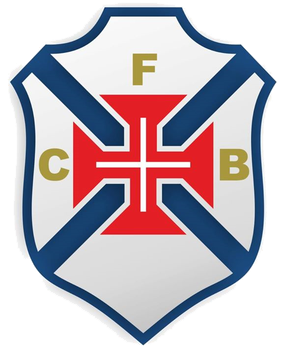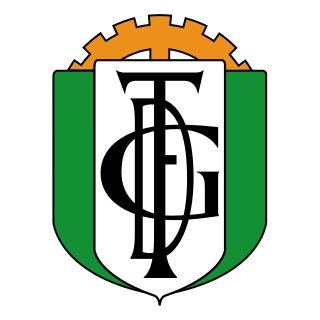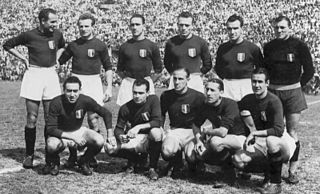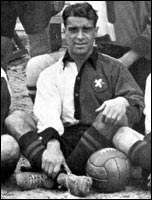
Clube de Futebol Os Belenenses, commonly known as Os Belenenses or simply Belenenses, is a Portuguese sports club best known for its football team. Founded in 1919, it is one of the oldest Portuguese sports clubs. It is based in the 19,856-seat Estádio do Restelo in Belém, Lisbon, hence the club name, which translates as "The ones from Belém". Among its fanbase, the club is commonly nicknamed O Belém, in reference to the neighborhood; Os Pastéis, in reference to a traditional Portuguese pastry originated in Belém; Azuis (Blues) or Azuis do Restelo, in reference to the club's color and its home stadium; and A Cruz de Cristo, for its emblem, or also "Os Rapazes da Praia", a reference to the zone of Belém in the earlier 20th century.

Barreiro (Portuguese pronunciation:[bɐˈʁɐjɾu] is a city and a municipality in the Setúbal District in Portugal. The population in 2021 was 78,345, in an area of 36.39 km2.
Carlos António do Carmo Costa Gomes was a Portuguese footballer who played as a goalkeeper. He was also a football manager.
Fernando Albino de Sousa Chalana was a Portuguese football player and manager.

José Augusto Pinto de Almeida, known as José Augusto, is a Portuguese retired football winger and manager.
João Mendonça Azevedo was a Portuguese footballer who played as a goalkeeper.
Carlos Manuel Correia dos Santos, known as Carlos Manuel, is a Portuguese retired professional footballer who played as a central midfielder, and a manager.

Futebol Clube Barreirense is a Portuguese sports club founded on 11 April 1911. The main sports are football and basketball. In both sports, the club has represented Portugal in European competitions. In basketball, the club won 2 national championships and 6 Portuguese Cups. The club also offers chess, gymnastics and kick-boxing.

Barreirense Futebol Clube is a sports club in Maio Island, Cape Verde based in the village of Barreiro in the south of the island and mainly plays in the stadium in the southeast of Cidade do Maio. Barreirense is the third most successful football (soccer) club on Maio having won about 5 official regional titles. Since the implementation of the Second Division in 2015, Barreirense are now the five unrelegated clubs of the island.

Grupo Desportivo Fabril is a Portuguese sports club established as Grupo Desportivo CUF do Barreiro, with CUF standing for the company Companhia União Fabril. A multisports club best known for its football section, it was founded as a works team in the city of Barreiro, District of Setúbal, on 27 January 1937. CUF Barreiro's greatest achievement was a third place in the 1964–65 Portuguese Liga season. The club's football home ground is the Complexo Desportivo Alfredo da Silva, which was inaugurated in June 1965 and named after Alfredo da Silva, an entrepreneur who was the founder of CUF.
Anselmo Fernandez Rodrigues was a Portuguese architect and football manager who led Sporting Clube de Portugal to victory in the UEFA Cup Winners' Cup in 1964 and was the architect of Sporting CP's Estádio José Alvalade inaugurated in 1956.

Iosif Fabian was a Romanian football player and coach who played as a striker.
Arsénio Trindade Duarte, simply known as Arsénio, was a Portuguese footballer who played as a forward.
Artur da Silva Quaresma was a Portuguese footballer who played as a forward.

Lusitano Ginásio Clube, MHC, also commonly known as Lusitano de Évora, is a Portuguese sports club based in Évora competing in the Campeonato de Portugal, the fourth-tier league in the Portuguese football system. Founded 11 November 1911 by a group of high school and commercial school youngsters in the house of professor Dâmaso Simões at Rua das Fontes, No. 3 in Évora as Lusitano Académico, it subsequently became Lusitano Futebol and finally Lusitano Ginásio Clube in 1925. The club's home ground is the Campo Estrela in Évora, purchased in 1931.
Joaquim Filipe dos Santos was a Portuguese footballer who played as a midfielder.
The 1942–43 Taça de Portugal was the fifth season of the Taça de Portugal, the premier Portuguese football knockout competition, organized by the Portuguese Football Federation (FPF). Clube de Futebol Os Belenenses was the defending champion but lost in the quarter-finals to Sporting Clube de Portugal. The final was played on 20 June 1943 between Benfica and Vitória de Setúbal.
Arthur "Artur" John was an English football manager who managed Vitória de Setúbal, Benfica and Sporting CP in Portugal.

Francisco dos Reis Stromp was an association football player and coach, founding member and Club official of the Sporting Clube de Portugal.








